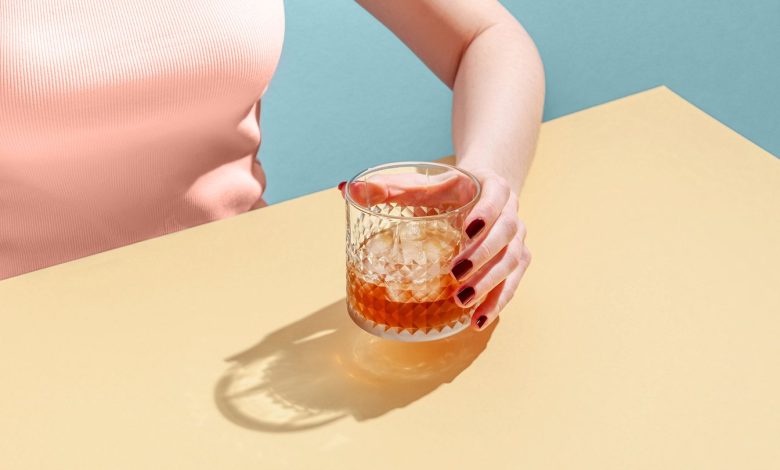Can You Drink Alcohol if You Have GERD?

[ad_1]
How Alcohol Can Trigger Reflux in GERD
Drinking alcohol may contribute to GERD symptoms in at least a couple of ways, according to Evans.
In people with GERD, the barrier between the stomach and the esophagus (the tube that food and beverages travel through to reach your stomach) doesn’t function properly. This barrier — known as the lower esophageal sphincter (LES) — is in an area in the lower esophagus surrounded by muscles that relax it. But the LES can also relax when you aren’t swallowing, which lets your stomach contents flow back up into the esophagus, as Mount Sinai describes.
“What can happen with GERD is the lower esophageal sphincter relaxes, which makes it easier for food or acidic components of the stomach to travel up into the esophagus,” Evans explains. “There’s also the possibility that alcohol could weaken or relax that sphincter, which can allow acid to come back up more frequently.”
In addition to potentially contributing to your LES relaxing, alcohol may directly irritate the lining of your esophagus or stomach, Evans says. This irritation may be a factor in GERD symptoms, leading to greater discomfort when your stomach contents enter your esophagus.
In a research review published in the journal Alcohol and Alcoholism, the authors found that participants who drank regularly had a 48 percent higher risk for GERD than those who drank alcohol occasionally or not at all. Those who drank fewer than three to five times or days per week were 29 percent more likely to have GERD than occasional drinkers or nondrinkers, while those who drank alcohol more often than three to five times per week were 112 percent more likely to have GERD. Other studies, though, have shown mixed results.
Alcohol and Other GERD Triggers and Risk Factors
It’s important to remember that GERD triggers can act in combination with one another, and that any single trigger by itself might not be enough to cause symptoms. When it comes to alcohol, any symptoms could depend on what you eat or drink along with the alcohol itself.
“Carbonated beverages are a common GERD trigger, and more acidic beverages like fruit juices can be a trigger,” says Evans. That means, for example, that a glass of wine might not cause GERD symptoms in a given person, but a cocktail containing soda water or citrus juice could lead to reflux.
And all the usual dietary GERD triggers — such as fatty or fried foods, spicy foods, and tomato-based sauces — can also interact with alcohol to cause symptoms. So while many people have less digestive upset from alcohol when they consume it with food, that might not be the case in a given person with GERD, according to Evans.
Should You Limit or Abstain From Alcohol?
The decision to reduce or eliminate your alcohol intake is ultimately a personal one, Evans says.
“It’s really a case-by-case basis,” she explains. “Patients with GERD don’t need to completely avoid alcohol, but they may need to modify their intake to help control their symptoms” — and the amount of alcohol that one person can tolerate without GERD symptoms won’t be the same as for another person.
Another variable in how much alcohol you can tolerate could be the type of beverage, regardless of the overall amount of alcohol. Most research on GERD has focused on alcohol as a broad category, but certain people may tolerate beer, wine, or mixed drinks better than the others — or even certain kinds of beer, wine, or cocktails. It may take “a lot of experimentation to see what works,” Evans notes.
And it’s entirely possible, if not likely, that you’ll experience fewer GERD symptoms if you avoid alcohol entirely. Only you can decide if this is the best decision for you, or if you can reduce your symptoms enough by paying attention to how often or how much you drink alcohol — or how alcohol may interact with other personal GERD triggers.
Tips for Drinking Alcohol if You Have GERD
If you suspect that alcohol may be related to your GERD symptoms, here are some tips for drinking that could reduce those symptoms.
- Drink less often. Those who drink less than three to five times or days per week tend to have a lower GERD risk.
- Drink less at a time. “A small amount of alcohol or any other GERD trigger will be less likely to produce symptoms than a larger amount,” Evans notes.
- Drink slowly. The more slowly you drink, the less alcohol there will be in your stomach and bloodstream at any given time.
- Drink with smaller or lighter meals. “GERD tends to happen when there is more content in the stomach, so it’s possible that if you’re consuming alcohol with a lighter meal, you might have fewer symptoms,” says Evans.
While some people may come to understand how alcohol affects their GERD symptoms without much time or effort, others may not get a clear picture right away — especially when it comes to how drinking interacts with other potential triggers. “It can take some trial and error to figure out,” Evans says.
[ad_2]




